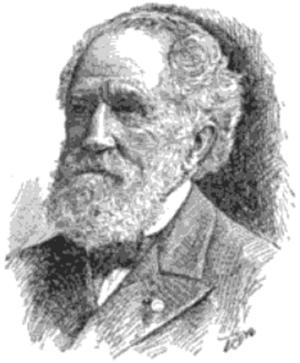Samuel D. Hastings facts for kids
Quick facts for kids
Samuel D. Hastings
|
|
|---|---|
 |
|
| 4th State Treasurer of Wisconsin | |
| In office January 4, 1858 – January 1, 1866 |
|
| Governor | Alexander W. Randall Louis P. Harvey Edward Salomon James T. Lewis |
| Preceded by | Charles Kuehn |
| Succeeded by | William E. Smith |
| Member of the Wisconsin State Assembly from the Buffalo, Jackson, and Trempealeau district |
|
| In office January 14, 1857 – January 4, 1858 |
|
| Preceded by | Position Established |
| Succeeded by | Harlow E. Prickett |
| Member of the Wisconsin State Assembly from the Walworth 3rd district |
|
| In office January 10, 1849 – January 9, 1850 |
|
| Preceded by | Erasmus Richardson |
| Succeeded by | Alex S. Palmer |
| Personal details | |
| Born |
Samuel Dexter Hastings
July 24, 1816 Leicester, Massachusetts, U.S. |
| Died | March 26, 1903 (aged 86) Evanston, Illinois, U.S. |
| Resting place | Woodlawn Cemetery Green Bay, Wisconsin |
| Nationality | American |
| Political party | Republican Free Soil (before 1854) |
| Spouse | Margaretta Schubert |
| Children | Sarah Elizabeth (b. 1838; died 1847) Emma Margaretta (b. 1840; died 1840) Samuel Dexter Jr. (b. 1841; died 1931) Emma Margaretta (Hobart) (b. 1845; died 1914) Florence Lydia (Hoyt) (b. 1852) |
| Parents |
|
| Profession | merchant, banker, politician |
Samuel Dexter Hastings (born July 24, 1816 – died March 26, 1903) was an important American figure from Wisconsin. He was a businessman, a banker, and a real estate dealer. He also worked as an activist, a lawmaker, and a reformer. Hastings served two one-year terms in the Wisconsin State Assembly.
Contents
Early Life and Activism
Samuel Hastings was born in Leicester, Massachusetts, on July 24, 1816. His parents were Simon and Betsey Hastings. His family history goes back to Thomas Hastings, who was an early settler in Massachusetts in the 1600s.
Samuel later moved to Philadelphia, Pennsylvania. There, he became involved in the anti-slavery movement. This movement worked to end slavery in the United States. In 1846, he moved to the Wisconsin Territory, settling in a town called Geneva.
Public Service and Politics
Serving in the State Assembly
In 1849, Hastings was elected to the Wisconsin State Assembly. He represented the Free Soil Party, a political group that opposed the expansion of slavery. He took over from Erasmus Richardson.
During his time in the Assembly, Hastings introduced several important bills. These bills aimed to push lawmakers to take a strong stand against slavery. His proposals, known as the "Hastings resolutions," asked Wisconsin's representatives in the U.S. Congress to use their power to:
- Stop new states that allowed slavery from joining the country.
- Ban slavery in all federal territories.
- Cancel any laws that favored slave labor over free labor.
These ideas caused a lot of discussion among the different political parties. Eventually, the Free Soilers realized they needed to stay a separate party to achieve their goals. After his term, Alexander S. Palmer took his place in 1850.
Hastings later moved to La Crosse, Wisconsin, and then to Trempealeau.
State Treasurer of Wisconsin
In 1857, Samuel Hastings was elected to the Assembly again, this time as a Republican. He then served as the State Treasurer of Wisconsin from 1858 to 1866. This role meant he was in charge of the state's money.
He also served as a trustee for important state organizations. For example, he was a trustee for the State Hospital for the Insane in Madison.
Later Political Efforts
Hastings was also a strong supporter of the temperance movement. This movement encouraged people to live healthier lives by avoiding certain habits. In 1884, he ran for Governor of Wisconsin as a candidate for the Prohibition Party. In 1892, he ran for the Assembly again, also as a Prohibitionist, representing Madison.
Community Involvement
Samuel Hastings was a founding member of the Wisconsin Academy of Sciences, Arts and Letters. This organization promotes science, art, and learning in Wisconsin. He also served as the Treasurer for this group.
He believed that introducing wine widely in the United States would not help prevent people from drinking too much.
Samuel Dexter Hastings passed away on March 26, 1903, in Evanston, Illinois. Some of his important papers and writings are kept at the Wisconsin Historical Society.
Images for kids
 | Delilah Pierce |
 | Gordon Parks |
 | Augusta Savage |
 | Charles Ethan Porter |


